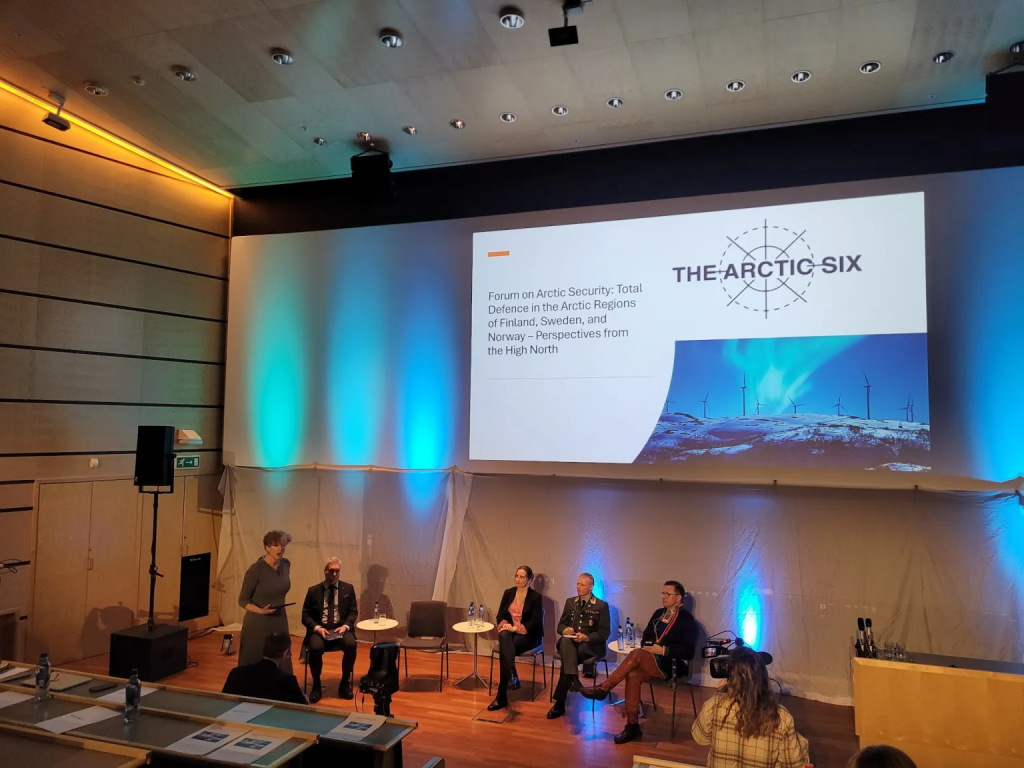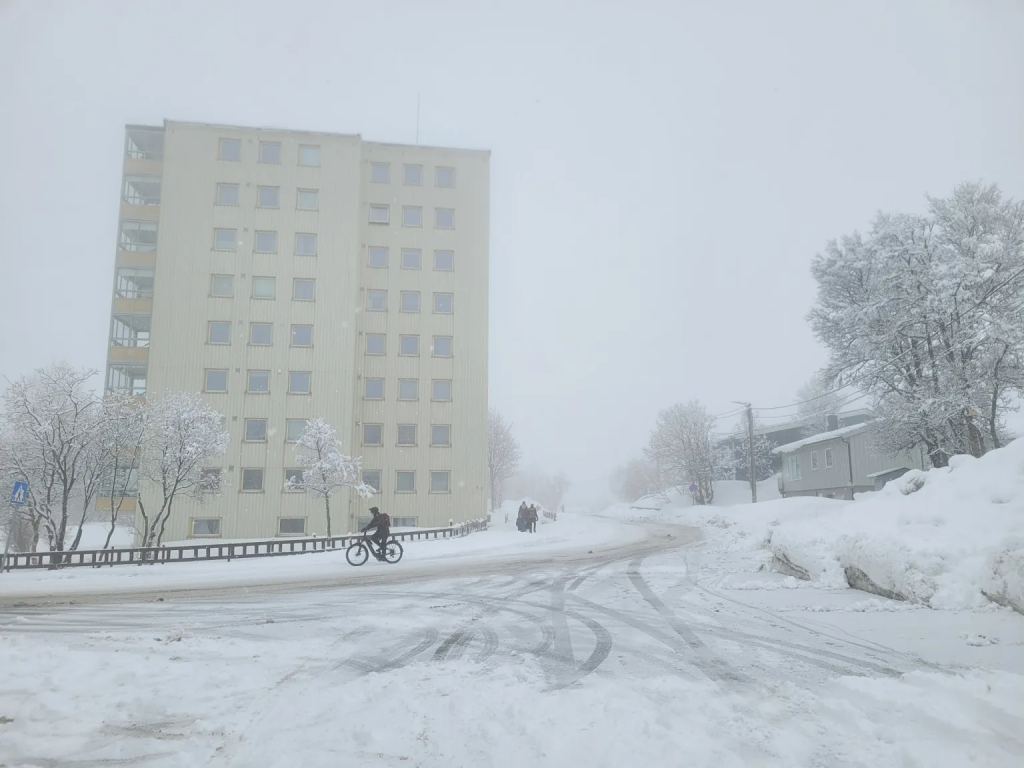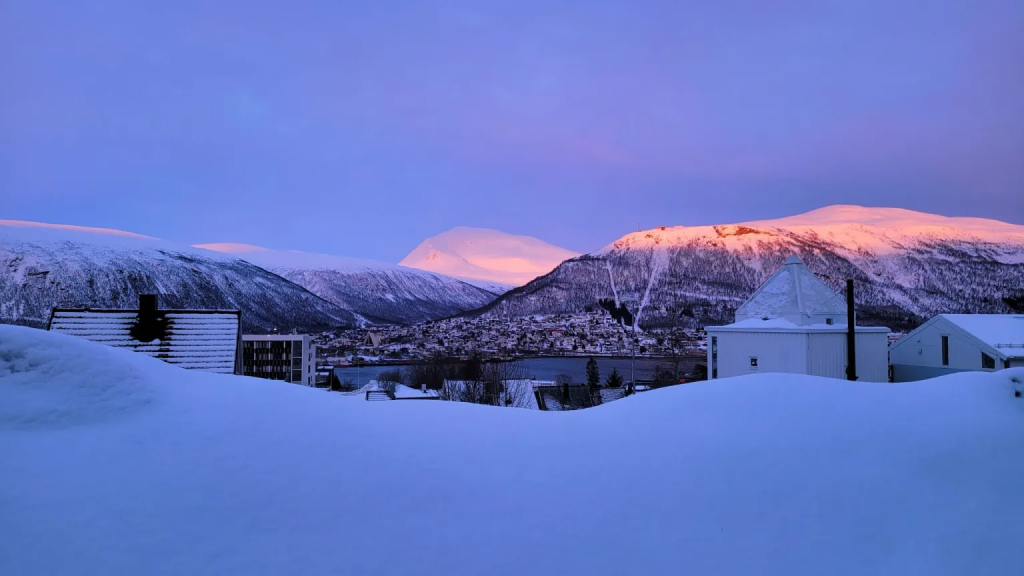Blog: Sámi call for inclusion in ‘total defense’ at Arctic security forum

While the Nordic countries are preparing their citizens for the worst, they are neglecting to turn to those who are some of the most self-sufficient: Sámi.
For all the tranquility of the Nordic countries, discussions of ‘total defense’ have risen high on the radar since the full-scale Russian invasion of Ukraine in 2022. Finland, Sweden, and Norway all mail their residents emergency preparedness booklets now, which people are advised to keep handy in the case of crisis or war. (The Swedish one, naturally, recommends keeping a stash of “cheese in a tube“.) Tossing it into the recycling bin is not recommended because if the power were to go out, as it did on Monday in Spain and Portugal, you can forget about accessing the digital version.
While Oslo, Stockholm, and Helsinki are preparing their citizens for the worst, they are neglecting to turn to those who might be some of the most self-sufficient: Sámi.
At a small single-day conference on Arctic security on Monday held at UiT The Arctic University of Norway in Tromsø, Laura Junka-Aikio, professor of northern politics and governance from the University of Lapland, criticized, “When we are talking about total defense, it seems that the Sami have become invisible.”
Six Nordic universities – the ‘Arctic Six’ – hold their first security forum
Junka-Aikio was addressing the audience at the first-ever forum on Arctic security convened by the Arctic Six: a group of half a dozen universities across Norway, Sweden, and Finland. They are: UiT The Arctic University of Norway and Nord University (Norway), Luleå University of Technology and Umeå University (Sweden), and the University of Lapland and University of Oulu (Finland).
The Arctic Six promotes itself as an educational partnership. Yet as one academic from Norway explained during the coffee break, the group can equally be thought of as a lobbying organization whose goal is to convince the Nordic governments of the value of funding science and research. In a time when hard security is stealing resources and attention from ‘softer’ issues like education and the environment, universities must make the case for their usefulness to society – and to governments and their militaries, too.
That is likely one reason why the Arctic Six decided to convene a forum on security, which is the trending topic lately in Arctic affairs. If universities can wield their security credentials, then their work will seem more relevant to capitals keen on shoring up their defenses. Gone are the days when climate change dominated conference programs and plenaries. Now, everything is security, whether it’s national security, energy security, or cybersecurity. Every issue, it seems, is being securitized.
And with US President Donald Trump cajoling European governments to spend more on defense, there is money to be made in security. Norway’s defense budget, for instance, will total NOK 110.1 billion (~US $ 10.6 billion) this year, representing an increase of 21 percent compared to last year. Oslo’s defense spending equates to $1,920 per person at current exchange rates. The US, in contrast, spends $2,932 per person.
The Arctic Six Forum on Arctic Security included speeches by a couple of heavy hitters from the Norwegian government. One was Deputy Minister Eivind Vad Petersson, Ministry of Foreign Affairs, who spoke by Zoom. He expressed, “Broadly speaking, the security situation remains stable but less predictable.” With a surprising degree of reassurance, he added, “In 2022, I was mentally prepared for things to get a bit rocky in the High North. So, three years later, things remain surprisingly calm.”
Norway is adapting to the times, though. The government is finally in the process of updating its High North strategy released in 2006 – a time closer to the collapse of the Soviet Union than today. While the document aimed to make the Arctic a priority and to ensure stable relations with Russia, the new strategy will no doubt reflect the worsened geopolitical (and environmental) context. Norway also has its work cut out for it multilaterally, with Deputy Minister Petersson noting that a major challenge that remains is to “ensure that the Arctic Council survives.”
Deputy Commander of the Norwegian Army, Trond Nilsen, also offered his views to the audience on the security situation. Speaking in person, he observed, “When it comes to the armed forces, we have a huge build up. Sweden and Finland are now members of NATO.” With all of this militarization come tanks, jets, and soldiers to an area that is not only the High North, but which is also Sápmi: the homeland of the the people who have moved with the reindeer, fished the rivers and fjords, and collected berries under the midnight sun for millennia.
Sámi seek consultation on all matters, including militarization
“When Norway talks about the High North, it’s actually about Sápmi. So we should start with that: [all] military spending in the North should have the consideration that Sámi should be a part of it.” So argued Martin Rimpi from Árran, the Lulea Sámi Center. Like Junka-Aikio, he spoke convincingly about the need to engage Sámi in discussions about the changing security situation. He admitted that he found it “very, very, strange” that his people are not included in planning for how civil society should react during crisis and war, especially in the Arctic. “We have reindeer, knowledge about snow, knowledge about terrain, reading, guiding – but we are not mentioned anywhere,” he stressed.
Sámi, Junko-Aikio noted, are the people who epitomize the resilience that is necessary when social infrastructure collapses. They know how prepare and store food without electricity, to travel across the snow, and to live off-grid. “These are all skills of the Sámi that could be central for resilience in the north if things go really bad,” Junka-Aikio stressed.
She underscored the importance of Sámi for the defense of the Nordic nations while deploring how they are left completely out of the picture in discussions about both civilian and military preparedness for crisis and war. This glaring omission, she pointed out, was exemplified by the use of a photo of windmills on a snowy landscape for the main event backdrop.

“It is ironic here that the picture shows windmills because especially in Norway, the windmill epitomizes threats to Sami security and Sami futures,” she reminded. Wind turbines and power lines associated with developments like the controversial Fosen Vind project have severely impacted Sámi lands, resulting in court cases going all the way up to the Supreme Court of Norway.
Junka-Aikio spoke of the existence of a “paradox” in the way that Nordic societies are preparing to defend themselves without including Sámi in their discussions. The lack of Sámi inclusion stings all the more given their increased political organization since the Cold War. Describing the Sámi Parliaments formed in Norway (1989), Sweden (1994), and Finland (1997), Rimpi noted, “We have a bigger acknowledgement of Sami rights and we have political institutions.” He cautioned, “Now, when defense spending is rising, they will meet a Sámi society that has higher expectations of the democratic process than ever before.”
Sámi are also looking to their neighbors in Greenland for how to strengthen their presence in military and security discussions. Little by little, Denmark is ceding the stage to Greenland in Arctic affairs. For instance, in 2021, the two countries agreed that Greenland would speak first at Arctic Council meetings and be the main signatory on relevant documents.
Rimpi also pointed out that while there has never been a Sámi representative in NATO Parliament, Denmark has included Faroese and Greenlandic people in their delegations. “It’s almost like Sami are a blind spot, even though the weight of the Norwegian army is in the north,” he contended.

The Árran representative suggested, “We have to rethink the Sami as a political resource for the total defense concept. We are supportive of this defense, definitely, because the alternative is so much worse. And we have inhabited these lands for a long time and we still want to live here. But they should defend our languages, our cultures, etcetera, so that the medicine doesn’t harm the patient.”
In this case, the medicine is militarization, and its impacts can be brutal for people and the environment alike. One only has to look at the radioactive waste that various US military experiments and disasters have left across Greenland, from the nuclear-powered abandoned Camp Century to the crash of a B-52G bomber carrying nuclear weapons. All of this happened in violation of Denmark’s nuclear-free zone policy instituted since 1957 across all of its territories.
What are we defending?
Overall, the Arctic Six Forum on Arctic Security did an excellent job of providing a platform for Sámi representatives to share their views on the impacts of northern militarization. Junka-Aikio and Rimpi both stressed that Sámi want to partner with the Nordic national governments to strengthen society and resilience. Sámi have a wealth of knowledge for how to survive in the North. This could prove useful for armed forces and civilian populations, even as there is increasing doubt over what they really would be fighting for if war were to break out.
Niklas Eklund, professor of political science from Umeå University, told the audience about his eagerness to join the military when he was a young man. “My motivation was rallying under the flag. Cold War, free world, all that stuff.” Now, he is seeing his son go off to the service. But the teenager has different motivations.
Eklund explained, “My son wants to go because he wants to know if he can do it. He’s individualized in his thinking. All this stuff about kings and queens, he goes to YouTube, watches speeches from influencers, but for him – he definitely wants to do it and I’m sure he will be loyal in the service – but he’s not there because of the Swedish king. He’s there because he wants to try himself out. This is a conundrum that’s right up there with the cell phones and what happens if they go dark.”

Sámi are distrusting governments that are loathe to engage them on military matters they would rather keep classified. Meanwhile, young conscripts are eager to get shredded rather than bow down. It seems that figuring what we are defending in the first place as liberal, multicultural societies in the 21st century might be a good place to start on the road to total defense.
Hopefully, though, that defense never turns to offense. When the final question was posed to the panel on ‘Perspectives on new security realities in the North’, which was, “How do we educate our populations and make them robust for the war to come?” Aikio-Junko had a definitive answer.
“We are discussing war as if it’s inevitable, as if we have no agency, as if defense doesn’t mean preventing war. We should also be discussing what can we do now to not have these wars and find diplomatic solutions to de-escalate the situation. This is something we are not even discussing here.”
Yet de-escalation is not what the strategists want to hear. It won’t bring money to contractors, and it won’t bring money to universities seeking to justify their existence to states that increasingly seek to be sounding the drumbeats of war themselves.
Canada: Will Carney win bring new investment, security to North, or more of the same? Eye on the Arctic
Denmark: Denmark’s king visits Greenland in show of unity amid Trump interest in territory, The Associated Press
Finland: US, Norwegian forces in Lapland for rapid reinforcement exercise, The Independent Barents Observer
Greenland: Arctic Economic Council, municipal group, support Denmark’s Arctic Council priorities, Thomson Reuters
Norway: Trump slaps tariffs on Arctic islands with almost no export, CBC News
Sweden: Swedish defence working on developing military drone force, Radio Sweden
United States: Greenland ‘Freedom City?’ Rich donors push Trump for a tech hub up north, Reuters



